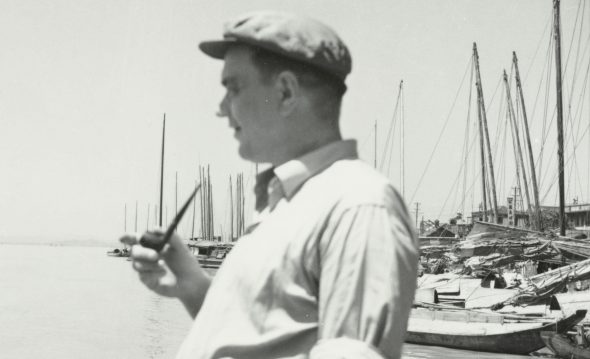Archive for December, 1984
Eroica
Issue 4/1984 | Archives online, Fiction, poetry

Ilpo Tiihonen. Photo: Irmeli Jung
Poems from From Eroikka (‘Eroica’, 1982). Introduction by Pertti Lassila
Ilpo Tiihonen (born 1950) published his first collection of poetry in 1975. From the beginning, his poems have been couched in the language of the street, and he uses slang liberally. Tiihonen has always been opposed to the miniature idylls of nature that were so characteristic of the 1970s. He aims at the secularisation of poetry, and he uses humour and comedy as a counterweight to high culture. He has evidently been influenced in his technique by Mayakovsky and Yesenin, to whom he often refers in his poems. His preferences in the poetic tradition are apparent in the fresh and liberal new interpretations of poems by Gustav Fröding contained in his collection Eroikka. Unusually for a contemporary Finnish poet, Tiihonen makes extensive use of rhyme. The result is often strongly lyrical poems that could almost be called modern broadsheet ballads, and may also bring Brecht to mind. More…
Bearded Madonna
Issue 4/1984 | Archives online, Fiction, poetry
Poems from Parrakas madonna (‘Bearded Madonna’, 1983). Introduction by Pertti Lassila
The first volume of poems by Eira Stenberg (born 1943) appeared in 1966; since then she has published both poems and children’s stories. In her most recent collection, she examines human relationships within the family, divorce, motherhood and childhood. Stenberg’s voice is clear and concrete. Her treatment of both mother and child is unsentimental, sometimes ironic; perceptively and farsightedly she deals with the importance of childhood in the way it predestines the fate of the individual. No love or hate burns/ like that we receive as a gift from childhood, Stenberg writes in one of her poems. The home – protective, restrictive and punishing – is often the scene of her poems. The man, the father, is the butt of considerable irony and criticism, but Stenberg also destroys the myth of the madonna-like mother and the idyll of the home. More…
An intimation of Paradise
Issue 4/1984 | Archives online, Fiction, poetry
Poems from Paratiisiaavistus (‘An intimation of Paradise’, 1983). Introduction by Pertti Lassila
Satu Salminiitty (born 1959) has published only one collection of poetry since her first appeared in 1981, but with these two volumes she has achieved considerable success. She writes with a fine rhetoric using language and rhythm that are far removed from those of spoken Finnish. Religious pathos has a prominent place in her work, and her poems often derive from praise, prayer or even magic incantations; Salminiitty is a creator of vision who trusts to her metaphysical intuition, a quality not generally discernible among today’s Finnish poets. Equally rare is her lively faith in the goodness and beauty of people and of the world. A conscious rejoinder to materialism, pessimism and fear of the future can be read in her poems. More…
Narcissus in winter
Issue 4/1984 | Archives online, Fiction, Prose

Risto Ahti. Kuva: Harri Hinkka
Poems from Narkissos talvella (‘Narcissus in winter’, 1982). Introduction by Pertti Lassila
Risto Ahti (born 1943) published his first work in 1975. His poetic expression finds form remarkably often in prose poems, and Narkissos talvella is made up exclusively of these. His poems transmute language into a mystical, surreal world, sometimes enigmatic and subjective in the extreme, and at its best strangely suggestive. It is as if Ahti’s world were in a state of constant change, subjected to a relentless process of demolition and rebuilding. The experience of the individual, generally his encounter with truth, is central to many of Ahti’s poems; the inner reality of a person manifests itself as more essential than the outward appearance. Ahti’s poems exhibit a fruitful contradiction: on the one hand, the accuracy with which he uses words and, on the other, the continual shape-changing and lack of definite boundaries of the world they describe. More…
Patsy, the artist of the lumber camps
Issue 4/1984 | Archives online, Fiction, Prose
A short story from Atomintutkija ja muita juttuja (1950). Introduction by Aarne Kinnunen
Deep in the wilds, where the only sound is the sad, primeval sighing of the forest, it is easy to succumb to a mood of boredom and melancholy. It may sometimes occur to you that in such a place you are wasting your life. Real life goes on elsewhere, in places with more people, more signs of human activity, more light, more gaiety…
You fell a tree, severing a string of that mighty instrument, the forest. You saw it into logs, you strip off the bark: it all seems dull and pointless. Sometimes the rain decides to go on for days: the trees have streaming colds, droplets hang from every needle-tip. You make for the shelter of a lumber camp. But the low-roofed rest-hut, deep in the forest, looks a dreary place, the well-known faces are so dull, the talk so futile. You feel you know in advance what each man is going to say. And the food, too, is just the same as usual, the same old rubbishy mush. The sight of the pot, with its blackened sides, gives no pleasure: you know all too well what is in it. And those grubby playing-cards, how disgusting! The mere sight of them is enough to make you feel defiled… More…
The blow-flower boy and the heaven-fixer
Issue 4/1984 | Archives online, Fiction, Prose
A short story from Puhalluskukkapoika ja taivaankorjaaja (‘The blow-flower boy and the heaven-fixer’, 1983). Interview by Olavi Jama
Cold.
A chill west wind came over the blue ice. It went right to the skin through woollen clothes. Shivers ran up and down the spine, made shoulders shake.
In the bank of clouds close to the horizon, right where the icebreaker had crunched open a passage to the shore, hung a pale blotch, a substitute for the sun. It gave off more chill than warmth.
Lennu’s teeth were chattering.
He wore a buttoned-up windbreaker, a hand-me-down from Gunnar, over a heavy lambswool shirt. It couldn’t keep off the cold. More…


